Third Degree I.D. is an LLC with three partners in Savannah, Georgia. They design, develop, and market instructional products and services for the corporate, education, government, and healthcare e-learning industries. Their focus is on high-quality instructional design and new media development, delivering programs and courses for distance education and e-learning markets.
The company uses an object-oriented design methodology to create flexible and scalable content. They aim to have a diverse client portfolio by working with clients from various sectors. They also build long-term relationships with returning customers and repurpose educational content.
Each of the three partners will invest $35,000 into the company, and they are seeking a two-year loan of $30,000 to complete the start-up funding. Around $19,000 of the initial funding will cover start-up expenses and assets. The remaining funds will support operations for the first year, during which Third Degree I.D. will provide at-cost work to influential clients to establish a strong reputation for their capabilities. This reputation will form the basis for marketing and sales strategies in subsequent years.
Their conservative sales goal for the first year is $360,000, based on market research and their combined expertise. Growth estimates for years 2 and 3 are based on data from similar businesses in the industry.
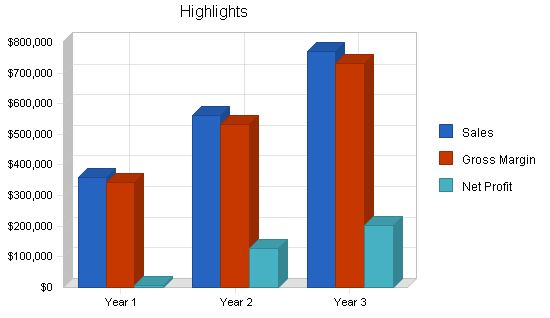
Contents
1.1 Objectives
The key objectives for Third Degree I.D. in the first year are:
- Establish a legal business through licensing.
- Complete business planning and pursue funding through venture capital, bank loans, grants, and contracts.
- Establish a web presence and list products and services in industry-relevant websites and publications.
- Contract with six to eight clients requiring consulting, training, design, or development work ($50,000 or more).
1.2 Mission
Third Degree I.D. designs, develops, and markets instructional products and services for the corporate, education, government, and healthcare e-learning industries. It provides cost-effective, progressive, flexible, and well-supported solutions to instructional design and e-learning operational needs. Its primary goal is client satisfaction, serving client interests as an ally and loyal business partner. The company operates for profit and offers an engaging work environment for its owners, employees, and contractors.
1.3 Keys to Success
Success will depend on:
- Persistent and creative client development efforts
- Exceptional product and service quality
- Time-efficient and cost-effective development processes
- Expert management and knowledgeable staff
- Cash-savvy growth strategies
Company Summary
Third Degree I.D. is located in Savannah, Georgia. It sells instructional design products and services to the corporate, education, government, and healthcare e-learning markets. The company is committed to high-quality instructional design and educational new media development. It sells program/curriculum design and development, course design and development, program/curriculum and course evaluation, content analyses and revision, rich-media production, e-learning training, e-learning consulting, and additional services such as market research, editing, document workflow, and translation. Third Degree I.D. employs an object-oriented design methodology that yields flexible, scalable, and reusable content. This approach provides clients with rich, targeted solutions that are easily replicated and maintained.
2.1 Start-up Summary
To begin the business, we require $5,924 in start-up expenses and another $13,000 in non-cash assets. Details of these requirements can be found below.
Expenses
Legal Expenses
- Attorney Consultation — $300
- Initial Filing Fee for LLC — $400
- Name and Logo Trademark — $300
Website Expenses
- Website Domain (2 Years) — $14
- Website Hosting (1 Year) — $96
Communications
- Stationery/Letterhead + Envelopes (500 set) — $500
- Business Cards (500 x 3) — $300
Memberships and Subscriptions
- Coastal Beta — $75
- eLearning Guild — $95
- Faculty Finder.com — $745
Software
- Authoring and Multimedia Software for Sony Vaio — $1,000
- Authoring and Multimedia Software for Mac Powerbook — $1,000
- Authoring and Multimedia Software for SH Desktop — $300
Long-term Assets
DS Laptop (Sony Vaio) — $2,500
MH Laptop (Mac 15″ Powerbook — $2,500
SH Desktop + Laser Printer + Scanner — $2,000
Networked Content Server — $6,000
Start-up Investment
Each of the founding partners will make an equal investment of $35,000 in starting the business. Additionally, the partners intend to secure a 2-year commercial loan of $30,000 to cover the working capital requirements for the initial period of operations.
All startup expenses and funding requirements are summarized in the tables below.
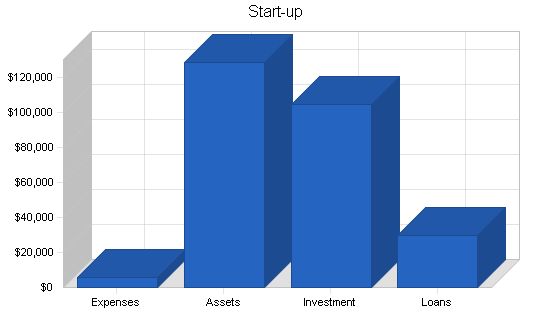
Start-up Requirements
Legal: $1,000
Annual State Fees: $300
Insurance: $200
Website domain and hosting: $109
Stationary/Business Cards: $800
Office Supplies: $100
Wireless Home Network (Airport): $200
Memberships/Subscriptions: $915
Software: $2,300
Total Start-up Expenses: $5,924
Start-up Assets
Cash Required: $116,076
Other Current Assets: $0
Long-term Assets: $13,000
Total Assets: $129,076
Total Requirements: $135,000
Start-up Funding
Start-up Expenses to Fund: $5,924
Start-up Assets to Fund: $129,076
Total Funding Required: $135,000
Assets
Non-cash Assets from Start-up: $13,000
Cash Requirements from Start-up: $116,076
Additional Cash Raised: $0
Cash Balance on Starting Date: $116,076
Total Assets: $129,076
Liabilities and Capital
Liabilities
Current Borrowing: $30,000
Long-term Liabilities: $0
Accounts Payable (Outstanding Bills): $0
Other Current Liabilities (interest-free): $0
Total Liabilities: $30,000
Capital
Planned Investment
S. Hines: $35,000
M. Meyer: $35,000
D. Stanford: $35,000
Additional Investment Requirement: $0
Total Planned Investment: $105,000
Loss at Start-up (Start-up Expenses): ($5,924)
Total Capital: $99,076
Total Capital and Liabilities: $129,076
Total Funding: $135,000
Company Ownership
Third Degree I.D. is structured as a limited-liability company (LLC), consisting of three executive partners: Susan Hines, Mona Meyer, and Daniel Stanford, who will function as the CEO, CLO, and CCO, respectively.
Services
Third Degree I.D. focuses on program/curriculum design and development, course design and development, program/curriculum and course evaluation, content analyses and revision, rich-media production, e-learning training, e-learning consulting, and additional services such as market research, editing, document workflow, and translation. These services are broken down as follows:
Program/Curriculum Design & Development
– New Program Services
– Existing Program Services
Program Design & Development
Third Degree I.D. provides development services for clients based on educational best practices and client specifications. The services align with institutional goals and exceed accreditation and/or compliance standards.
New Program Services
Needs Analysis Report
Clients are charged based on the project scope, typically tied to the length and/or number of programs/curricula. For example, a needs analysis report for an e-learning certificate or academic “minor” would cost $3,600.
Estimated Development Cost:
– Base Charge: $2,400
– 7- to 12-Course Series: $3,000
– 13- to 16-Course Series: $3,600
– 17- to 20-Course Series: $4,200
Funding Assistance
Clients receive assistance in raising funds externally to cover start-up and operation expenses. The initial consulting charge is $75 per hour, with subsequent efforts charged at $50 per hour.
Program/Curriculum Prospectus
The prospectus outlines program/curriculum objectives, viability, development dependencies, implementation constraints, market study, and evaluation plan.
Estimated Development Cost:
– Base Charge: $2,400
– 20% discount for clients purchasing a needs analysis report
Program/Curriculum Development Plan
The development plan covers program/curriculum specifications, curriculum design, course-series or individual course requirements, and project timelines.
Estimated Development Cost:
– Base Charge: $400 to $1,000
– 20% discount for clients purchasing a curriculum prospectus report
Program/Curriculum Implementation Strategy
The strategy report recommends ways to optimize program/curriculum support, enrollment goals, scheduling, instructor recruitment, content-reuse, and technical support strategies.
Estimated Development Cost:
– Base Charge: $500 to $1,250
– 20% discount for clients purchasing a program/curriculum development plan
Program/Curriculum Evaluation Plan
The evaluation plan includes qualitative and quantitative strategies, survey collection instruments for curriculum and course analysis to meet accreditation and/or compliance standards.
Estimated Development Cost:
– Base Charge: $800 to $1,400
– 20% discount for clients purchasing a curriculum prospectus report
Existing Program Services
Program/Curriculum Evaluation Report
The evaluation report analyzes a program/curriculum and provides recommendations for content, structure, and delivery improvements.
Estimated Development Cost:
– Base Charge: $300 to $6,000
– 20% discount for clients purchasing a curriculum evaluation report
Program/Curriculum Strategy Report
The strategy report analyzes the current implementation and operations strategy of a program/curriculum, recommending optimization and leveraging strategies.
Estimated Development Cost:
– Base Charge: $500 to $1,250
– 20% discount for clients purchasing a curriculum evaluation report
Program/Curriculum Maintenance (on Retainer)
Basic maintenance of courses and learning objects in an e-learning program or curriculum is provided at a monthly fee of 5% of the overall program/curricula charge.
Course Design and Development
Third Degree I.D. provides course- or project-development services in accordance with established curriculum plans. The services produce instructionally sound, engaging course work that exceeds institutional accreditation standards.
Estimated Development Cost per Unit:
Base Charge: $400 to $1,200
Learning Object Development
Third Degree I.D. designs and develops rich-media learning objects to enhance course interactivity, simulate real-world scenarios, and provide stimulating alternatives to traditional instruction.
Object Types:
Level 1, Level 2, Level 3
Cost estimates for Development Options and Delivery Options are available upon request.
Additional Development Services and Pricing:
– Course or Program Design Consultation: $1,000
– Needs Analysis and Market Study Development: $1,500 per program
– Course or Program Marketing Plan Development: $250
– Multimedia Localization: $400
– Assessment Development: $150 per assessment
– Image Selection/Enhancement: $300 per 25 images
– Video and Audio Enhancement: $700 to $1,050 per 7 clips
Third Degree I.D. specializes in e-learning instructional design for the corporate, educational, healthcare, and government sectors. The emphasis is on corporate and educational markets, which are expected to experience the most growth.
The projected Year 1 business is $360,000, with at least three 7- to 12-course series (e.g. professional certificates or master’s degrees). Higher-ed clients will account for 50% of the revenue, corporate clients will contribute 40%, and K-12 clients will make up the remaining 10%.
According to the Booz Allen Hamilton white paper, "Re-Learning E-Learning," the compound annual growth rate for higher ed is 25%, corporate is 30%, and K-12 is 30%. These estimates were used to calculate the new-development revenue for each sector.
Additionally, Third Degree I.D. expects to generate revenue through reuse and relicensure at a rate of 25% of cumulative revenue from year to year.
The e-learning market is expanding globally, with the United States accounting for 37.5% of the $2 trillion training and education market. The corporate sector has the greatest demand for e-learning, with potential savings of "30 to 60 percent" compared to traditional classroom instruction.
Higher education and K-12 are also substantial markets, with a combined industry value of over $100 billion. The increasing number of computer-savvy high school graduates and the need for expanded educational opportunities are driving the demand for e-learning in these sectors.
Although the healthcare and government sectors are adopting e-learning at a slower pace, there is a strong interest in both industries. The healthcare industry has an 80% interest level, with a 30% commitment, while the government sector shows a 50% interest level, with a 39% commitment.
Overall, Third Degree I.D. is well-positioned to meet the growing demand for e-learning in various sectors, leveraging its expertise and comprehensive range of services.
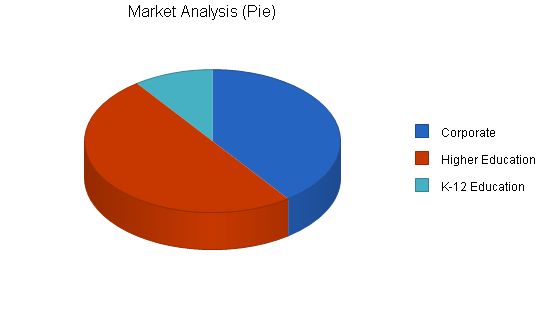
Potential Customers Growth Year 1 Year 2 Year 3 Year 4 Year 5 CAGR
Corporate 30% 144,000 187,200 243,360 316,368 411,278 30.00%
Higher Education 25% 180,000 225,000 281,250 351,563 439,454 25.00%
K-12 Education 30% 36,000 46,800 60,840 79,092 102,820 30.00%
Total 27.57% 360,000 459,000 585,450 747,023 953,552 27.57%
4.2 Target Market Segment Strategy
Third Degree I.D. focuses on the corporate and educational markets as they represent the e-learning growth sectors locally and regionally. Savannah and the Lowcountry experience genuine growth in high-tech businesses and are home to over 20 colleges, universities, technical institutes, and educational centers in higher education alone.
4.3 Service Business Analysis
The educational services industry comprises numerous existing businesses competing in multiple segments. K-12, colleges/universities, and corporate training providers historically utilized instructor-led approaches. However, e-learning has emerged as a cost-saving alternative that allows for increased geographical reach and offers significant development and delivery advantages.
4.3.1 Competition and Buying Patterns
Traditionally, the competition in e-learning has been among large, proprietary CMS/LMS vendors and IT-infrastructure companies. However, the focus has shifted towards the actual content delivered as more affordable and open-source systems emerge. Third Degree I.D. leverages this trend by emphasizing user-centered instructional design and creating object-oriented content that can be easily installed and migrated across different systems. The company also specializes in designing and developing for popular proprietary CMS/LMS systems while maintaining interoperability and compliance standards.
Strategy and Implementation Summary
Third Degree I.D. focuses on four e-learning markets: corporate, educational, healthcare, and government sectors. While expanding its business nationally and internationally, the company prioritizes developing long-term local and regional clients.
Target customers for Third Degree I.D. are upper-level management individuals responsible for day-to-day e-learning operations.
5.1 Competitive Edge
Third Degree I.D. provides personal, customized instructional design services that larger proprietary systems vendors cannot match. The company prioritizes understanding market opportunities, business goals, and user requirements to deliver effective instructional solutions. By asking probing questions and delivering superior solutions, Third Degree I.D. distinguishes itself in instructional design.
Third Degree I.D.’s first-year marketing strategy focuses on initiating personal contacts, demonstrating excellence in every interaction, and winning key clients through expertise demonstration and limited initial investment. The company aims to make a name for itself.
During the initial year, Third Degree I.D. faces marketing challenges due to being a newly formed partnership without immediate name recognition. However, the custom content development industry lacks major recognition among consumers, even those successful in the market. Third Degree I.D. aims to overcome these challenges by showcasing the cost-effectiveness and superior service of outsourcing content development to a well-equipped development house.
5.3 Sales Strategy
Third Degree I.D. promotes its products and services through its website and targeted advertising in e-learning and distance education portals and publications. The company also utilizes direct mailings to businesses and institutions planning online program rollouts or experiencing accreditation problems related to e-learning.
5.3.1 Sales Forecast
During the first year of operations, Third Degree I.D. will generate sales from new content and curriculum development. The company plans to make the content reusable and repackage it for future clients, thus reducing overall development costs. Additionally, 25% of cumulative previous years’ sales are expected to come from reused content.
In conclusion, Third Degree I.D. focuses on delivering personalized, high-quality instructional design services and aims to establish long-term relationships with key clients. The company will also position itself as a leader in the industry by offering innovative learning objects and implementing a comprehensive marketing strategy.
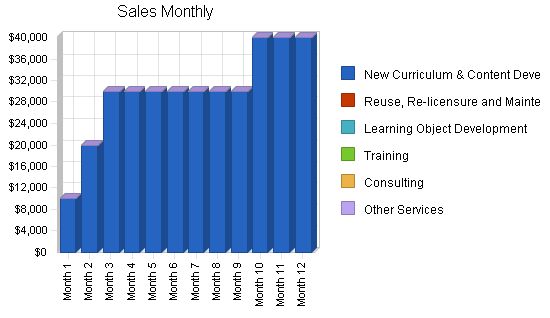
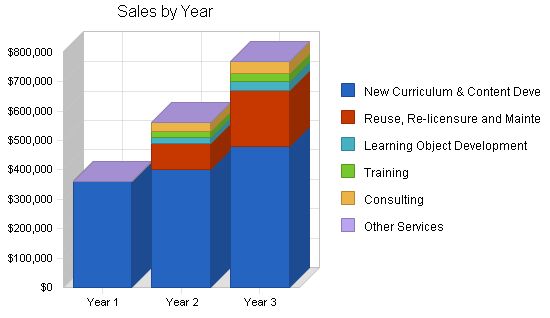
Sales Forecast:
| Sales Forecast | |||
| Year 1 | Year 2 | Year 3 | |
| Sales | |||
| New Curriculum & Content Development | $360,000 | $400,000 | $480,000 |
| Reuse, Re-licensure and Maintenance | $0 | $90,000 | $190,000 |
| Learning Object Development | $0 | $20,000 | $30,000 |
| Training | $0 | $20,000 | $30,000 |
| Consulting | $0 | $30,000 | $40,000 |
| Other Services | $0 | $0 | $0 |
| Total Sales | $360,000 | $560,000 | $770,000 |
| Direct Cost of Sales | Year 1 | Year 2 | Year 3 |
| Software packaging | $18,000 | $28,000 | $38,500 |
| Other Services | $0 | $0 | $0 |
| Subtotal Direct Cost of Sales | $18,000 | $28,000 | $38,500 |
5.4 Milestones:
Our milestones for the initial period are summarized below.
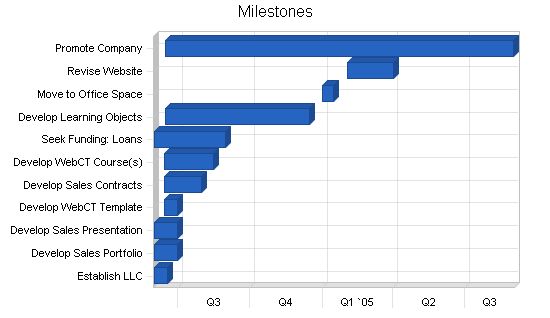
Milestones:
Milestone Start Date End Date Budget Manager Department
Establish LLC 6/1/2004 6/18/2004 $400 CEO Business
Develop Sales Portfolio 6/1/2004 6/30/2004 $0 CEO/CLO/CCO Business/Design
Develop Sales Presentation 6/1/2004 6/30/2004 $0 CEO/CLO/CCO Business/Design
Develop WebCT Template 6/14/2004 6/30/2004 $0 CEO/CLO/CCO Design
Develop Sales Contracts 6/14/2004 7/31/2004 $0 CEO/CLO/CCO Business
Develop WebCT Course(s) 6/14/2004 8/15/2004 $0 CEO Design
Seek Funding: Loans 6/1/2004 8/31/2004 $0 CEO/CLO/CCO Business
Develop Learning Objects 6/15/2004 12/15/2004 $0 CLO/CCO Design
Move to Office Space 1/1/2005 1/15/2005 $1,000 CEO/CLO/CCO Business
Revise Website 2/1/2005 4/1/2005 $0 CEO/CLO/CCO Business
Promote Company 6/15/2004 8/31/2005 $6,000 CEO/CLO/CCO Business/Design
Totals $7,400
Web Plan Summary:
The Third Degree I.D. website will familiarize potential clients with the company’s unique approach to instructional design and e-learning content development. It will establish Third Degree I.D. as an experienced instructional design group with over 25 years of collective experience.
6.1 Website Marketing Strategy:
The website will showcase Third Degree I.D.’s instructional design through learning object samples and case studies. It will demonstrate how the company can create engaging and effective learning experiences. The website will also provide supplementary information for existing clients through a client extranet.
Internationally-known educational media organizations and online ads will drive traffic to the Third Degree I.D. website, improving visibility and generating interest.
6.2 Development Requirements:
The Chief Creative Officer will be responsible for developing the Third Degree I.D. website, including domain registration, web hosting, site design, and database integration for the client extranet.
Management Summary:
Third Degree I.D. is a small company with a lateral structure. It will operate with three full-time founders in the first year and hire contractors as needed. As the business grows, additional staff will be added.
7.1 Personnel Plan:
Third Degree I.D. will be owned and operated by three executive partners: CEO, CLO, and CCO. The CEO will focus on consulting and project management, while the CLO and CCO will handle product development. The partners will work together to promote the business and manage office operations.
Future staffing plans include hiring a Technology Director to work with the CLO and CCO on database-driven learning objects and e-learning solutions. In the first year, outside consultants will provide support as needed. Additional development staff may be added as the client base grows.
Personnel Plan:
Year 1 Year 2 Year 3
Susan Hines $75,000 $75,000 $75,000
Mona Meyer $75,000 $75,000 $75,000
Danny Stanford$75,000 $75,000 $75,000
Inst. Designer $0 $0 $50,000
Prod. Assistant$0 $0 $30,000
Tech Director $0 $75,000 $75,000
Total People 3 4 6
Total Payroll $225,000 $300,000 $380,000
Hello!
I’m Andrew Brooks, a seasoned finance consultant from the USA and the mind behind phonenumber247.com.
My career is built on a foundation of helping individuals and businesses thrive financially in an ever-changing economic landscape. At phonenumber247.com, my aim is to demystify the complex world of finance, providing clear, actionable advice that can help you navigate your financial journey with confidence. Whether it’s personal finance management, investment strategies, or understanding the nuances of market dynamics, I’m here to share insights and tools that can propel you towards your financial goals.
Welcome to my digital space, where every piece of advice is a step closer to financial clarity and success!
